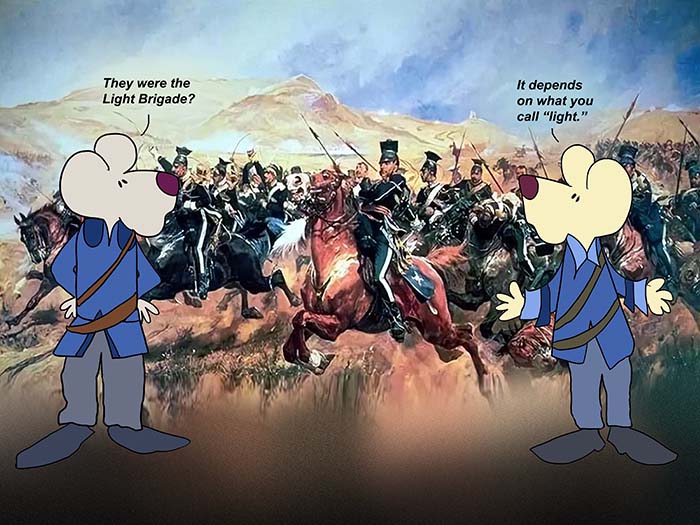My childhood was filled with so many good nooks and crannies. Those little surprises came about without notice. They were moments filled with wondrous things. At the time, I think I knew it.
Many of these occasions were generated by my Dad, I’d say. He’d be square in the middle of some task, and then he’d turn to us, pointing his wrench, and begin quoting some piece of literature in its fullest. The works of Edgar Allan Poe. The stanzas of great poets. The catchy verses from a long-ago song.
One of the poems in his repertoire was “The Charge of the Light Brigade” by Lord Alfred Tennyson. Dad would recite it with such conviction and emphasis. Those moments would delight me to no end, always asking Dad for “… just one more.”
I didn’t understand half of them. I thought The Light Brigade was some kind of mystical force of faeries, flying through the sky, lighting the night. Or maybe fireflies. Either way.
Today, I saw mention of it again. It was on this date, October 25, 1854, when the atrocity happened. The scene was infamous as an act of bravery in the face of unbeatable odds.
The British Army was attacking the Russian Army during the Crimean War. Yes, way over there in Crimea, the peninsula along the northern side of the Black Sea. Arguing over some this or that.
Members of the British light cavalry led a charge, sent by their commanders on a miscalculation, deep into the heart of the Russian Imperial Army.
In a matter of moments, 110 British soldiers died in the charge, 161 were injured, and 475 horses were killed. Tragic.
The events of that day reveal more than just the bravery of those guys rushing forward with no good end in sight. Instead, the things that happened that day reveal a Victorian army and society long bent on the corruption of its leaders.
That “Charge of the Light Brigade” shows an army largely controlled by aristocratic officers. They had gained wealth and influence due to their birthright. Those men held many personal vendettas, and their infighting often led to incompetence on the field. It happened on that day, at the cost of hundreds of lives.
What is it with these men and power, fighting and scraping over every little thing? For centuries now, we have seen this, time and again. Sometimes the “leaders” pay the price, but not very often. They sit in their thrones, be it a velvet seat in England, or a golden toilet in Washington, D.C., attempting to hoard power and money.
In this case, Lord Cardigan was the commander of The Light Brigade, the light cavalry, on their light, fast horses with light swords. They were supposed to go in and strike fast while the heavy cavalry would follow behind. Instead, the regiment met a wall of gunfire.
Lord Cardigan himself “somehow” became separated from his troops and was one of the first to return to safety. He quickly left the battlefield and retreated to his personal yacht just off the coast. There, he retired for the evening and enjoyed a champagne dinner.
Back home in England, Lord Cardigan found acclaim for his bravery. He made a speech in his hometown of Northampton, in which he claimed to have camped in a tent on the field with his troops and personally rallied his forces after the charge.
If his name sounds like the sweater, it is for good reason. The popularity of the cardigan, the knitted garment stems from this whole debacle. Reportedly, Lord Cardigan wore a knitted waistcoat into battle.
So not only does the leader get the acclaim, he also gets a memorial sweater.
Much of this reflects what is happening with the January 6th hearing, happening right now in Washington, D.C. There are many still wearing their MAGA cardigans, I suppose. But hopefully, people will see the true coward returning to his throne to plan another horrible attack.
==========
Three things cannot be long hidden: the sun, the moon, and the truth.
— Buddha
==========
Truth exists; only lies are invented.
— Georges Braque
==========
We swallow greedily any lie that flatters us, but we sip only little by little at a truth we find bitter.
— Denis Diderot
===========
The Light Brigade, and the thrones behind it
